We are Univerk-Broker SA, based in Switzerland, and have been in the dairy mediations business for more than 25 years. Our company was founded in 2015 with the aim of providing high-quality dairy products. Specializing in German-made cheese curds, we are the exclusivist for Bad Bibra curds in Italy. Since 2014, we have been cooperating with the DMK Group, a leader in the dairy industry.
HOW CURD IS PRODUCED
Curd production is a process that requires precision and attention to detail. Here's how it happens:
Milk collection:
The curd production process begins with fresh milk from our cows, carefully raised by our farmers. Only the best quality milk is selected for processing.
Fermentation:
The milk is then treated with live milk enzymes, which start the fermentation process, turning the milk into fresh curd.
Coagulation:
At this point, rennet, a natural enzyme that causes the milk to coagulate, separating the curds from the whey, is added.
Processing:
The curd is then cut, cooked and drained to reach the desired consistency. It is then salted and pressed to remove further liquid.
THE PLUSES OF UNIVERK-BROKER CURD PRODUCTION
Quality is guaranteed through careful monitoring of each stage of the production process, thus ensuring that each final product is of the highest quality. We use advanced technologies to produce the curd, maintaining freshness and nutritional value. We have also developed "lactose-free 45%" curd, an innovative product that is perfect for those who are lactose intolerant.
Choosing Univerk-Broker products means opting for exclusivity: in fact, we are the only distributors in Italy of the renowned Bad Bibra DMK curd. Our long experience, which exceeds 25 years, allows us to fully understand and meet the needs of the market. We are also strongly committed to sustainability, adopting environmentally friendly practices at every stage of production.
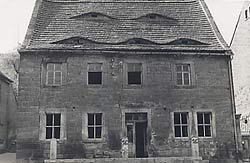 Molkereigenossenschaft Bad Bibra e.G. founded
Molkereigenossenschaft Bad Bibra e.G. foundedThe dairy cooperative was founded in 1918, initially processing milk and curd-based products. The dairy initially processed 3,000 litres of milk a day supplied by dairy farmers in and around Bad Bibra. The amount of milk delivered began to increase in the late 1920s and early 1930s.
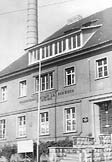 Dairy rebuilt on Thalwinkeler Straße
Dairy rebuilt on Thalwinkeler StraßeAfter agriculture began to be reestablished in the aftermath of the Second World War, the board decided to build a new dairy processing facility at the location it still occupies. The new plant was completed in 1951 and had the capacity to process 25,000 litres of milk a day into butter, cottage cheese, milk products, and “Bibertaler camembert”.
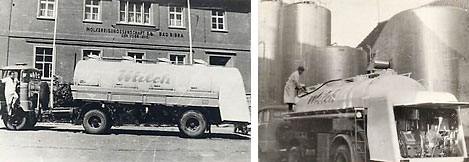 1965-1968
1965-1968Between 1965 and 1968, the dairies at Naumburg, Karsdorf, Zeitz, Heldrungen, Allstedt, Roßla, and Hayn were merged into the one at Bad Bibra.
- New cheese-making plant
The steady increase in milk supply led to the decision to build a new dairy processing plant in Bad Bibra between 1971 and 1973. The new plant could handle 1,500 tonnes a year.
- Expansion of the dairy
In 1985-1986, the cheese plant underwent a further expansion and then had a processing capacity of 3,000 tonnes a year. This allowed the production of slicing cheeses to be further expanded. The daily milk deliveries to Bad Bibra had climbed to between 80,000 and 100,000 litres a day, depending on the season. The Bad Bibra dairy cooperative is increasingly a well-known producer of slicing cheeses (Gouda and Edamer).
- The Fall of Communism
When the West German mark was introduced as the official currency of East Germany on 1 July 1990, it quickly became impossible to maintain production at Bad Bibra because the entire East German market had also collapsed overnight. All of the plants except Bad Bibra were closed in 1990-91. The workforce was slashed from 500 down to 90.
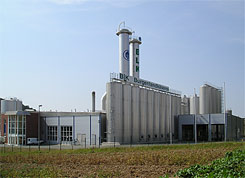 Construction of the Burgenland cheese factory
Construction of the Burgenland cheese factoryAfter German reunification, it only took Bad Bibra five years to leap forward. With the help of subsidies and a bank loan, it built the brand-new Burgenland cheese dairy has emerged, which Mr Heuser of the Dairy Industry Association has called “the most modern in Germany”. The plant with its phalanx of towers in glistening silver towns lies in the valley like a small town all its own. The lorries bring 850,000 litres of milk a day for processing to produce 35,000 (tonnes of) cheese.
- Expansion of speciality cheese production
In the presence of Minister of Agriculture Petra Wernicke and District Administrator Harri Reiche, Burgenland Käserei Bad Bibra opens its new speciality cheese factory. A new line to make the speciality cagliata cheese was established for around €7 million, including a state grant of almost €2.4 million.
- 2006
In 2006, the 98 employees at Bad Bibra had turned 308,000 tonnes of milk into 30,000 tonnes of cheese. The raw milk comes from 130 dairy farms in the eastern states of Saxony-Anhalt, Saxony, Thuringia, and parts of Brandenburg.
 Participation in the Humana Group
Participation in the Humana GroupOn 01.07.2009, the operations of Molkereigenossenschaft Bad Bibra e.G. were transferred to Humana Milchindustrie GmbH, a subsidiary of the Humana Group, thus opening a new chapter in the dairy’s history.
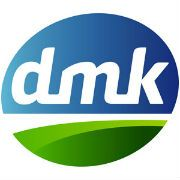 DMK founded
DMK foundedOn 01.05.2011, the business activities of Humana Group GmbH and Nordmilch AG were merged into Deutsches Milchkontor GmbH (DMK), thus establishing the largest German milk processor.
